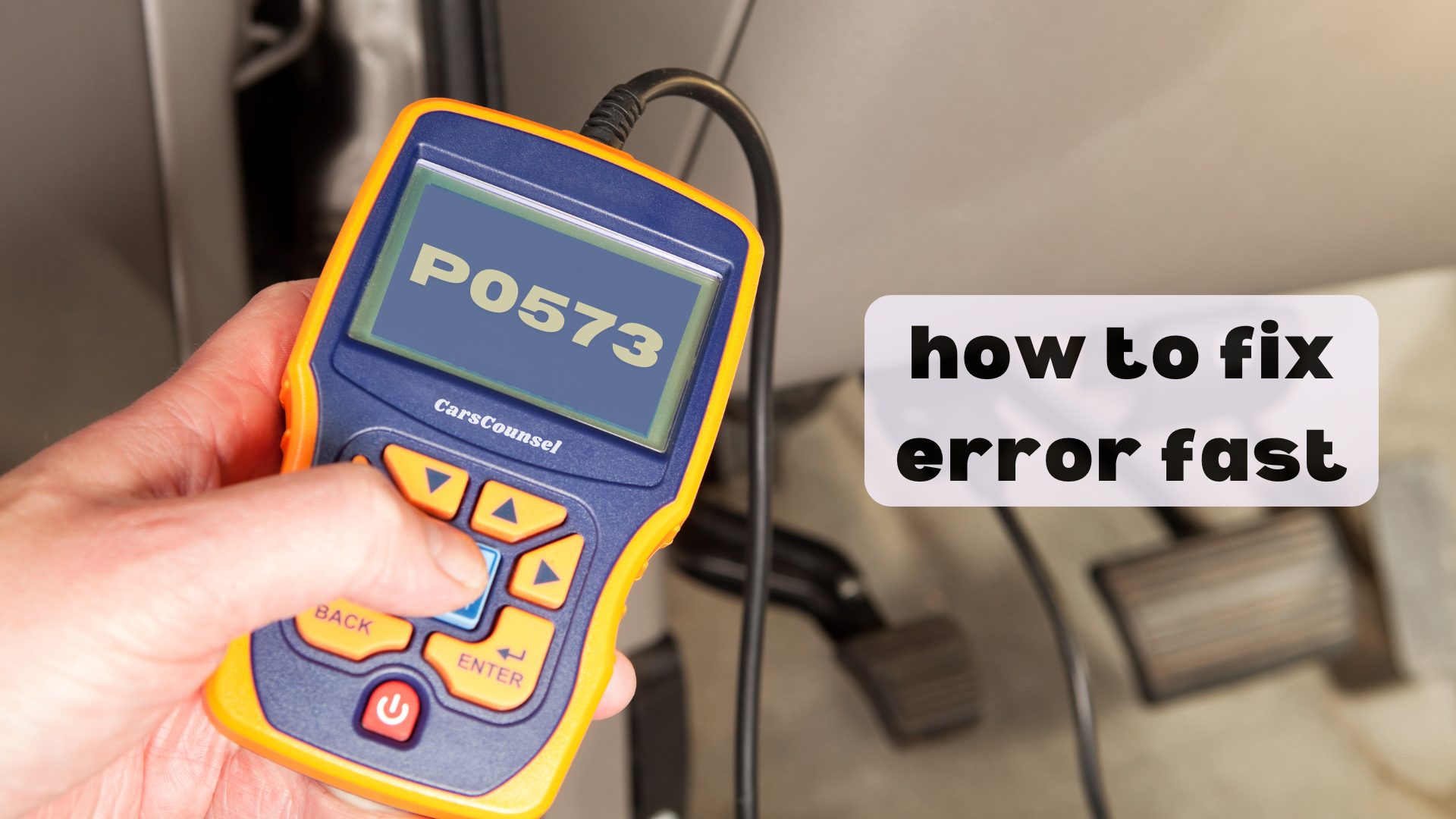Did you know that almost 30% of cars have problems with the brake pedal position sensor at some point? If you’ve got the P0573 code, fixing it quickly can save you a lot of trouble.
Start by checking the brake pedal position sensor, as it’s often the problem. Make sure to also look at the wiring for any damage or rust.
It’s important to confirm that all parts are working right, but there’s more to consider if you want a complete fix. How can you be sure you’ve covered everything?
Let’s go through the key steps to make sure your car runs smoothly.

Quick Navigation
Key Takeaways
- Replace the bad brake pedal position sensor (BPPS) to fix signal problems.
- Check and fix any damaged wiring connected to the brake switch circuit.
- Use a multimeter to test the brake switch voltage to make sure it’s working right.
- Clean or replace any corroded connectors to restore electrical flow.
What Is the P0573 Code
The P0573 code, which is part of the large set of OBD2 error codes, usually means there’s a problem with the brake switch circuit in your car. The car’s computer system detects this issue.
When the brake switch isn’t working right, it can send wrong signals, which can mess up the engine’s performance and turn on the check engine light.
This code is often linked to problems with your brake lights, making it harder for other drivers to see when you’re stopping. It can also cause systems like cruise control to stop working suddenly.
The car’s Engine Control Module (ECM) needs accurate signals from the brake switch to manage different functions, and any error can lower the engine’s efficiency.
In short, the P0573 code points to a critical brake switch problem that affects both safety and engine performance.
Why P0573 Code Matters
Understanding the P0573 code is really important because it affects both brake safety and how well your car performs. Fixing it quickly is crucial to avoid serious problems:
- Brake Light Problems: If your brake lights don’t work properly, other drivers mightn’t see you stopping, which can cause accidents.
- Cruise Control Issues: A bad brake switch can stop cruise control from working, making long drives less comfortable.
- Poor Braking: Inconsistent brake signals can make your brakes less effective, which is a big safety risk.
Common Causes of P0573
Faulty brake pedal position sensors often trigger the P0573 code, leading to inaccurate signals sent to the Engine Control Module (ECM). These sensors can wear out or malfunction, causing miscommunication within the system.
Wiring issues, like damaged or corroded wires, can cause voltage drops, which might result in short circuits or open circuits. Although rare, a failed ECM could also be to blame.
Problems in related systems like ABS, traction control, or cruise control can contribute to this code. Using diagnostic tools is essential to identify and fix these issues correctly.
Also, check the brake switch, as it’s a common cause of the P0573 code. Regular maintenance can help prevent these problems.
Faulty BPPS Symptoms
If your brake pedal position sensor (BPPS) is acting up, you might notice that your brake lights stay on all the time. This is a big safety problem. When this sensor doesn’t work right, it can mess up how your car runs and stays safe.
Here are some common signs:
- Brake lights staying on: This can kill your battery and confuse other drivers about when you’re braking.
- Cruise control not working: The brake switch signal is key for cruise control, and a bad BPPS messes this up.
- Dashboard warning lights: You might see warning lights about brake issues because of the sensor problem.
It’s really important to fix these issues quickly to keep your car safe and working well. Check the BPPS and brake switch for any damage or problems.
Wiring Issues and P0573
Damaged or corroded wires in the brake switch circuit can cause significant voltage drops, which might trigger the P0573 code.
When the wiring is faulty, it can mess up the electrical flow, leading to short circuits or open circuits.
Start by looking at the wiring to check for any wear, corrosion, or damage.
Use a multimeter to test the circuit and make sure the right voltage is getting to the brake pedal position sensor (BPPS).
If you find any bad wiring, fix it by replacing or soldering the damaged parts.
Ensuring the wiring in the brake switch circuit is in good shape is crucial to prevent the P0573 code from coming back and to keep your vehicle safe and running well.
Diagnosing the Code
To accurately diagnose the P0573 code, start by connecting an OBD-II scanner to confirm the code and check for any other brake system-related codes.
Then, follow these steps:
- Check the Brake Switch and BPPS: Look for any visible damage or rust.
- Test BPPS Voltage: Use a multimeter to ensure the voltage levels are correct.
- Inspect Wiring: Look for any damaged or rusty wires that could affect the brake switch.
Make sure the brake light switch works and that all connected parts are functioning properly.
If you can’t find the problem with these steps, it might be time to get professional help to check the ECM.
This thorough process will help you accurately diagnose the P0573 code and keep your brake system reliable.
Using an OBD-II Scanner
Connecting an OBD-II scanner is the first step in diagnosing the P0573 code. This helps you confirm the error and spot any related brake system issues.
Start by plugging the scanner into the OBD-II port, usually under the dashboard. It’s important to know that an OBD-II scanner reads your car’s computer for trouble codes.
Make sure your scanner can log data in real-time and clear codes. Once connected, follow the scanner’s instructions to get the stored codes. Confirm the P0573 code and note any other codes that might point to related problems.
You can also use the scanner to check brake system information, which helps you find the exact cause of the issue. This gets you ready for further inspection and repair.
Inspecting Brake Components
Start by looking at the brake pedal position sensor (BPPS) and the brake light switch for any signs of wear, rust, or visible damage. Focus on these areas:
- BPPS Condition: Check for cracks or rust that might affect how it sends signals.
- Brake Switch Integrity: Make sure the switch isn’t stuck or broken.
- Wiring and Connectors: Look for frayed wires or loose connections.
After the visual check, use a multimeter to test the circuits. Measure the voltage at the brake switch and BPPS to ensure they’re within the manufacturer’s recommended range.
Also, check the wiring to make sure there are no breaks. This detailed inspection helps find problems that could cause the P0573 code.
Fixing the P0573 Code
To fix the P0573 code, start by replacing the faulty brake pedal position sensor (BPPS). First, take out the old BPPS and put in a new one to ensure it sends the correct signals.
Then, check the wiring connected to the brake switch for any damage or corrosion and fix it if needed to keep the voltage flowing steadily. If the brake switch itself is causing problems, replace it.
After that, make sure the cruise control system works correctly, as it relies on the brake switch.
Preventing Future Errors
After fixing the P0573 code, make sure to keep up with regular maintenance to ensure the brake system stays in good shape. Keeping the brakes well-maintained is key to avoiding future problems.
- Check Brake Parts: Regularly look at the brake pads, rotors, and fluid levels to see if they’re worn out or damaged.
- Sensor Adjustment: Make sure the brake pedal position sensor (BPPS) is properly adjusted to prevent false alerts.
- Inspect Wiring: Occasionally check and clean the wiring connections to stop rust and electrical issues.
More OBD-II Codes
Frequently Asked Questions
Can a Faulty BPPS Affect My Car’s Cruise Control?
Yes, a bad brake pedal position sensor (BPPS) can mess up your car’s cruise control. If the BPPS sends wrong signals, it can turn off the cruise control, making it not work right and potentially unsafe.
How Do I Reset the P0573 Code After Repairs?
To reset the P0573 code after making repairs, use a diagnostic scanner. Follow the scanner’s instructions to clear the code. Make sure your brake pedal components are working properly to ensure your car is in good shape.
What Tools Do I Need to Diagnose the P0573 Code?
To figure out the P0573 code, you’ll need a diagnostic scanner to check the code and a multimeter to test the voltage. These tools will help you spot any wiring problems and make sure the brake switch circuit is working right.
How Often Should I Inspect My Brake System to Avoid the P0573 Code?
Did you know that 20% of brake failures happen because of poor maintenance? You should check your brakes every 6 months. Regular maintenance keeps you safe and helps prevent problems like the P0573 code.
Are There Any Temporary Fixes for the P0573 Code?
For quick fixes, check and clean any rusty connections and make sure the brake light switch is working right. These might solve the problem for now, but you’ll need to fix the main issue for a long-term solution.
Conclusion
Think of your car’s cruise control system like a chain, where each part is an important link. If one link—the BPPS—fails, the whole chain breaks, causing the P0573 code.
By inspecting and replacing the faulty sensor, checking the wiring, and making sure the brake switch works properly, you can fix the problem.
Remember, regular maintenance is important. Just like a well-oiled machine, your car will thank you with smooth, trouble-free performance.

